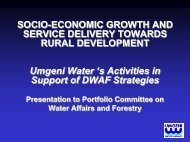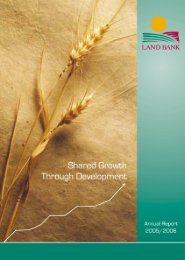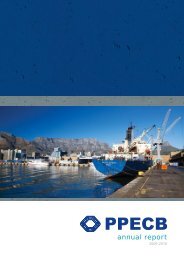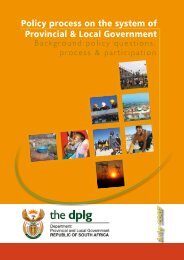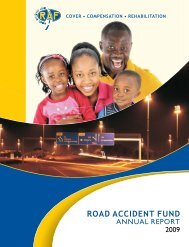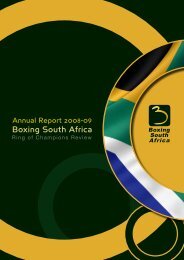Human Settlements Review - Parliamentary Monitoring Group
Human Settlements Review - Parliamentary Monitoring Group
Human Settlements Review - Parliamentary Monitoring Group
You also want an ePaper? Increase the reach of your titles
YUMPU automatically turns print PDFs into web optimized ePapers that Google loves.
<strong>Human</strong> <strong>Settlements</strong> <strong>Review</strong>, Volume 1, Number 1, 2010<br />
is not yet personal for many more affluent<br />
citizens around the world. We need to explore<br />
deeper how we can be with that information in<br />
a place of intensity and chaos. It seems clear<br />
that we need to find new ways to problems<br />
solve – be more soft, spongelike and receptive.<br />
The latest UN Climate Change Conference<br />
in Copenhagen in December 2009 failed to<br />
agree on a deal to tackle Climate Change.<br />
The failure of Copenhagen makes it clear that<br />
Copenhagen is read in very different ways by<br />
different people and that there is no common<br />
path towards change. There is the issue<br />
and challenge as to how to connect scientific<br />
research to legal and political measures - a<br />
gulf between law and all sciences seems to<br />
preclude such an exchange. Law has a very<br />
difficult time absorbing science and jurists<br />
reinterpret scientific work through a legal lense<br />
often obfuscating the results. So while some<br />
make sense of the failures at Copenhagen (also<br />
referred to as “Brokenhagen”, “Tokenhagen”<br />
or “Hopenhagen”) as the climate negotiations<br />
being highly complex and too technical for the<br />
politicians and lawyers, the author argues that<br />
we need to look still deeper than that.<br />
To many people it was no surprise that<br />
Copenhagen failed, given a negotiation<br />
process of such Byzantine complexity and the<br />
fact that most negotiating teams are mandated<br />
to defend the rights of their country to continue<br />
using oil and coal to fuel economic growth<br />
unless they are paid not to (Cullinan, 2009).<br />
For some critics the mainstream prescriptions<br />
amount to a complex politics of cooptation<br />
that leaves intact the underlying framework of<br />
economics and the market that is inimical to<br />
nature in the first place. Although the climate<br />
challenge is receiving a lot of attention these<br />
days, the global temperature increase is but<br />
a symptom. The planet has a ‘fever’, and it<br />
is essential to identify the disease in order to<br />
prescribe the right medication(Dahle, 2010: 87)<br />
(Lovelock, 2006). Those who focus exclusively<br />
on solutions are rather like doctors who only<br />
prescribe and never diagnose (Orr, 2009:xv).<br />
The solutions most talked about are<br />
technological and so neither require nor result<br />
in any particular improvement in our behavior,<br />
politics, or economics that brought us to<br />
our present situation in the first place (Orr,<br />
2009:xv). That some corporations have got the<br />
new religion on energy efficiency or greening<br />
their operations or carbon-trading schemes<br />
pales besides the fact that none is capable in<br />
Korten’s words of “voluntarily sacrificing profits<br />
to a larger public good” (Korten, 2007).<br />
Decolonising Nature – Knowledge<br />
of Nature and the Nature of Nature<br />
A view from the World People’s Conference<br />
on Climate Change and the Rights of Mother<br />
Earth in Cochabamba, Bolivia in April 2010<br />
for example is that the corporations and<br />
governments of the so-called “developed”<br />
countries, in complicity with a segment of the<br />
scientific community, have led us to discuss<br />
climate change as a problem limited to the rise<br />
in temperature without questioning the cause,<br />
which is the capitalist system. In other words<br />
COP is viewed as an attempt to only deal with<br />
effects, better allocating the pollution pie so to<br />
speak – using science to allocate maximum<br />
levels of pollution. The current international<br />
negotiations focus on political agreements<br />
133



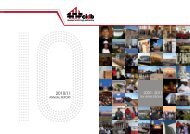
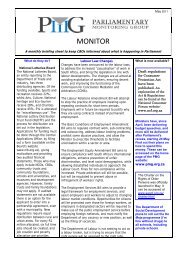
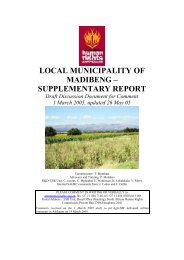
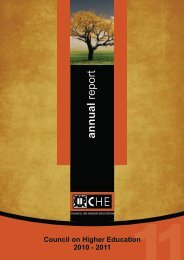
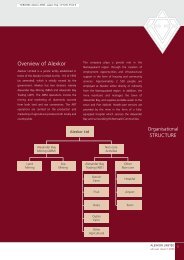
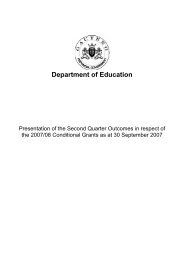
![National Research Foundation Annual Report 2008 / 2009 [Part 2]](https://img.yumpu.com/49774036/1/177x260/national-research-foundation-annual-report-2008-2009-part-2.jpg?quality=85)
